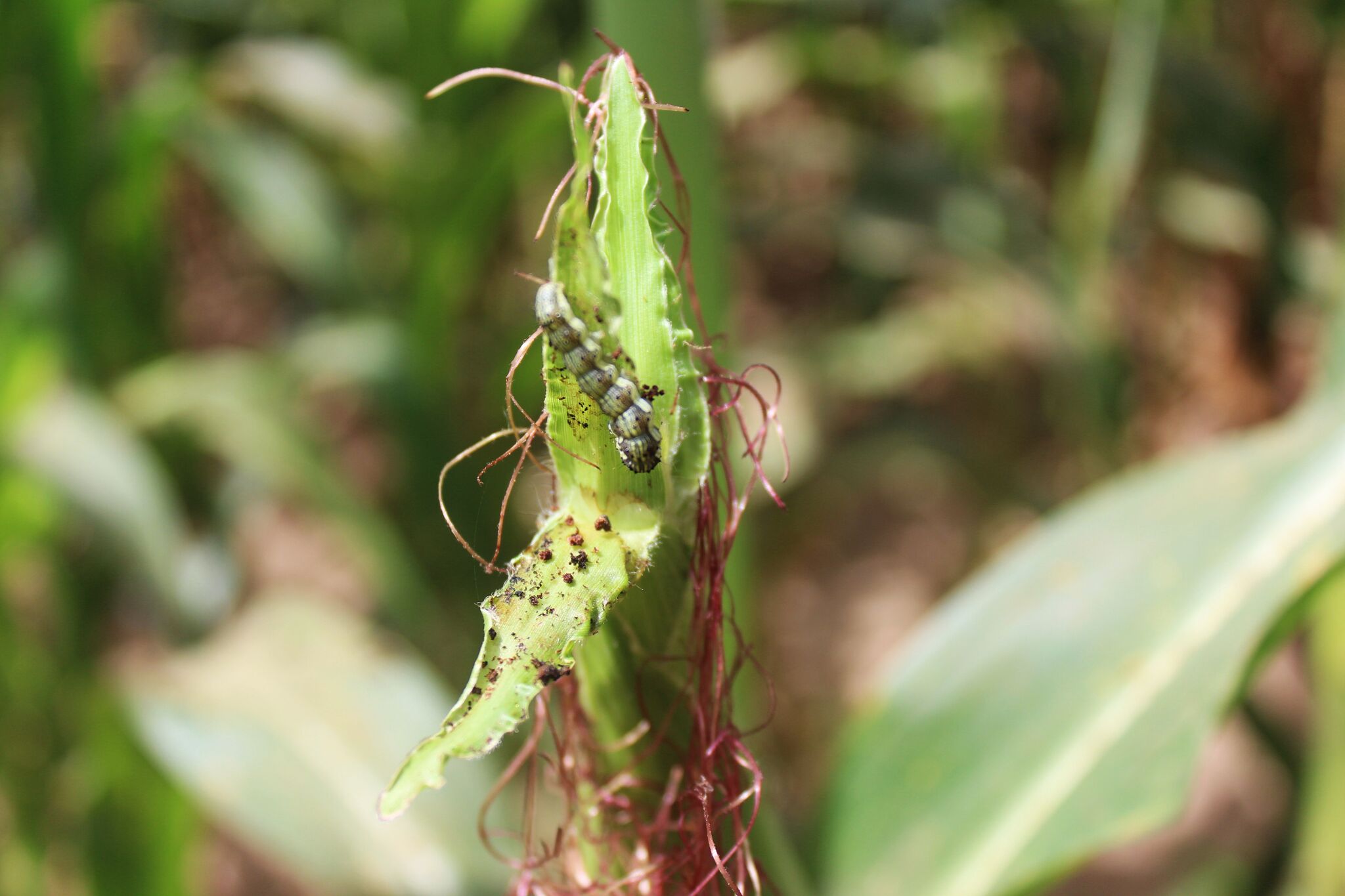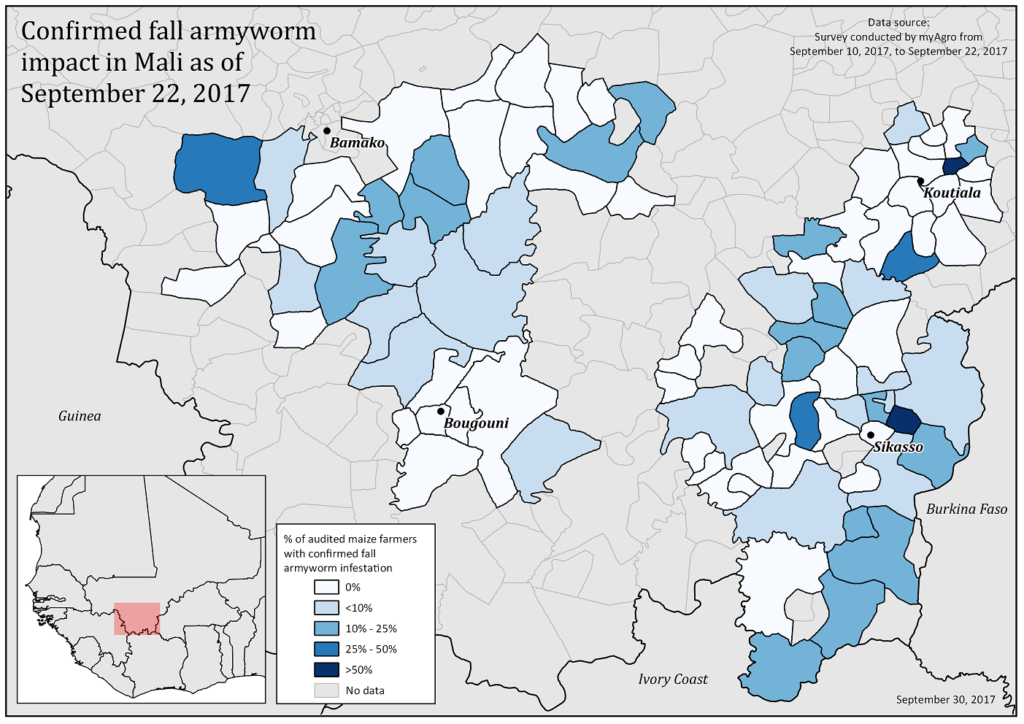
It was a hot afternoon in late August when farmer Kalifa Kone was walking through his maize field and noticed a gap in his eight-foot tall stalks. Unsure of the cause, he notified his myAgro field agent, Abdramane, who came to check it out. After closely inspecting the maize stalks, Abdramane held up his open hand to Kalifa and on it, a tiny brown-green worm with dark stripes.
“It’s the Fall Army Worm,” Abdramane said.
After explaining the implications of the pest, Abdramane advised Kalifa to harvest his maize early in order to avoid crop loss. Doing so could spare him damage to nearly half his harvest.
myAgro puts farmers at the center of all operations. No matter what comes up, myAgro’s priority is always to make sure farmers have the best harvests possible. This is done through careful data collection and monitoring, which allows myAgro to immediately add new products and services to their portfolio as they see fit, in order to quickly respond to farmers’ needs.
The Fall Army Worm (FAW) is indigenous throughout the Americas and is known as one of the most damaging crop pests. It has not previously been found outside the Americas until early 2016, when two strains were confirmed in West Africa. FAW has been especially devastating to maize yields in Africa, causing severe damage if caught too late. This is troublesome as maize is the most important staple crop grown by smallholder farmers in sub-Saharan Africa. FAW has been spreading quickly throughout Africa and has been identified in other West African countries, including Senegal.
As soon as FAW was found in Mali, myAgro quickly began collecting information in order to determine the immediate steps to take to prevent crop loss. In just ten days, myAgro designed a mobile application to detect the prevalence of FAWs, trained its field staff on identifying and explaining the impact of FAWs on farmers, and deployed agents to all myAgro districts, collecting 3,500 farm surveys in total. The results were then analyzed to inform myAgro’s next steps, which included advising farmers to harvest early.
Realizing the gravity of the FAW incident, myAgro shifted its program focus to proactively address farmers’ needs for the coming seasons. Monitoring efforts led myAgro to predict that FAW will spread and quickly multiply by the start of rainy season 2018, so it bundled insecticide into its maize packages and created an insecticide application program.
The program will begin by training field agents and vendors, who will then train farmers on how to identify FAW and use insecticide correctly and safely. With a thorough training of farmers, myAgro will follow the principles of integrated pest management (IPM) in order to economically suppress FAW while minimizing harm to farmers and the environment. In 461 villages across Mali, myAgro will give over 5,000 farmers access to a state of the art micron insecticide sprayer, which uses ten times less water than a traditional sprayer, as well as protection gear. myAgro will also ensure that a staff member is available in every village to provide assistance at the request of the farmers during spraying time. This program will enable farmers to spray their fields within three days of the first FAW identification, a crucial time for them to save their harvests.
Throughout the insecticide application program, myAgro will continuously monitor the prevalence and severity of FAW in every region. When myAgro field staff check-in on farmers, they will use their smartphones to send photos and GPS coordinates of the FAW to the M&E team. The M&E team will then generate weekly GIS “heat maps” showing FAW presence to determine where to focus their efforts and react quickly if needed. This monitoring will also provide information on the effectiveness of the insecticide spraying, allowing myAgro to troubleshoot if necessary.

Although the FAW was an unexpected circumstance that needed to be dealt with immediately, it is not just a temporary problem. If left unchecked, the FAW is not only a threat to the livelihood of farmers, but to food security across the continent. Therefore, it was vital that the actions myAgro took in response can be scaled in the future to help farmers in other countries where the FAW is present. If FAW becomes widespread in Senegal, for example, myAgro already has the systems in place to respond quickly and prevent crop damage for farmers. Furthermore, myAgro’s data collection and monitoring process can be used not only to inform myAgro’s activities, but to inform key stakeholders, such as governmental institutions.
The FAW incident is just one example of how myAgro designs its products and services with the farmers at the center of all planning. It is myAgro’s mission to ensure that farmers have larger harvests, so myAgro sees it as its responsibility to respond if anything threatens to prevent that.